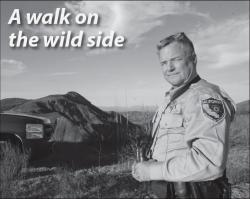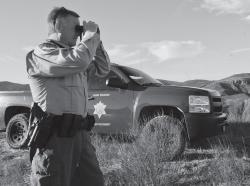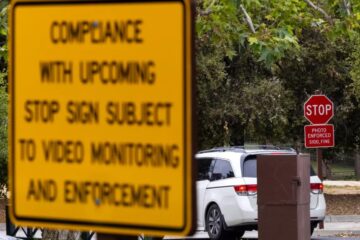Wildlife officer keeps watch over open spaces
Source of this article: The Thousand Oaks Acorn, January 9, 2014

BIRD’S-EYE VIEW—Dennis Rosenberg, an officer with Ventura County Fish and Wildlife, watches from the Newbury Park overlook as bicyclists ride the trails in Santa Rosa Valley on Dec. 31. He says binoculars are one of the most useful tools for his job.
Dennis Rosenberg stood a discreet distance from a group of men fishing along the shore of the Channel Islands Harbor in Oxnard. He watched them through his binoculars for a bit before coming closer to ask if they had fishing licenses.
“When I approached them, I learned that none of them had a license,” Rosenberg said.
“One guy said, ‘I wasn’t fishing. I was just watching.’And I said,‘So was I.’”
The incident, which took place about three years ago, was one of many such encounters the 58-year-old wildlife officer for the California Department of Fish and Wildlife has had during his time patrolling Ventura County’s great outdoors.
Wildlife officers, previously called fish and game wardens, patrol in and around lakes, rivers, beaches, wetlands, forests and deserts to manage the state’s fish and wildlife resources.
They are the police officers of the outdoors, warning, citing and arresting those who violate laws and regulations intended to protect and conserve fish and wildlife.
“(Wildlife officers) protect plants, animals and the habitats they live in,” said Mike Stefanak, the fish and wildlife captain for Ventura, Santa Barbara and Los Angeles counties. “Ventura County has a very diverse population of wildlife. . . . Our wardens are responsible for managing and enforcing the laws as they relate to those populations.”
There are approximately 350 wildlife officers in the state and about 10 in Ventura County.
Rosenberg, a Ventura resident, regularly patrols the southern and eastern portions of the county—a 600-square-mile territory that includes Thousand Oaks, Camarillo, Moorpark, Simi Valley.

A MAN AND HIS TRUCK—Fish and Wildlife officer Dennis Rosenberg patrols the southern and eastern portions of Ventura County. “I’m always learning,” says Rosenberg, who earned his badge in 2009 and has a degree in biology from Cal State San Francisco. IRIS SMOOT/Acorn Newspapers
Rosenberg spends the bulk of his workday in his official green pickup truck.
Wildlife officers will sometimes leave their assigned areas to assist with high-priority issues.
“We go where the action is,” said Rosenberg. “We’ll cover wherever we’re needed in the county.”
Otherwise, the seasons dictate his schedule, he said.
“No two days are the same. If it’s lobster season, we’re working the coast. If it’s deer season, we’re up in the mountains.”
The areas open to hunters and fishermen also depend on the time of year, he said.
“We want to give the deer a chance to breed and raise fawns.”
Rosenberg said many hunting and fishing laws are meant to keep people out of harm’s way.
“Bullets can travel over a mile,” he said. “It’s important to know what you’re shooting at and what’s behind it.”
He receives calls on a range of issues, including illegal activity and environmental concerns. On Monday, someone informed him of an illegal poaching.
Rosenberg’s job, like many positions in law enforcement, has the potential to be dangerous.
“We regularly deal with people who are armed,” he said. “When a city cop sees a gun, it’s a very bad sign. For us, it’s normal.”
The outdoorsman said he approaches every situation with caution.
“Safety comes first,” he said. “The most important part of your job is going home at night. You can’t protect the wildlife for 20 years if you get injured or killed in your first year of service.”
The former Boy Scout said he hasn’t come across a marijuana grove but knows officers who have. People who grow marijuana in hidden patches along the area’s wooded mountainsides are often heavily armed, Rosenberg said.
“I tell people, ‘If you see something unusual in the woods, turn around and go back.’ It’s very dangerous.”
It’s also his job to oversee oil leak cleanups to protect state waters from pollutants.
Anyone interested in becoming a wildlife officer must complete a lengthy application process that includes a criminal background check, an interview, a psychological evaluation and a written test.
Rosenberg completed seven months of training as a warden cadet at Butte College in Oroville, Calif., before earning his badge in August 2009.
There he learned how to use his firearm, conduct interviews and operate a wide variety of vehicles and equipment.
“Even though it’s really intensive, what you learn (at the academy) just scratches the service,” Rosenberg said. “Once you’re out of the academy, before you’re cut loose in your assigned area, you go through three one-month sessions with a field training officer. They’re kind of like mentors, who observe and help you while you’re out in the field.”
He will complete a wildlife forensics course next month.
“I’m always learning,” said the officer, who earned his degree in biology from San Francisco State University in 1981. “As a warden, I need to know all the regulations.”
Rosenberg has learned to be ready for anything.
“With this job, you never know what you’re going to see around the next corner.”
One of the things he’s seen is bobcats on back roads.
“To see wild animals where they belong is always very impressive,” the wildlife officer said.
Rosenberg said he enjoys meeting and talking to people.
“Most people know we’re the good guy,” he said. “They understand that we’re doing our jobs and they need to follow the rules.”



0 Comments